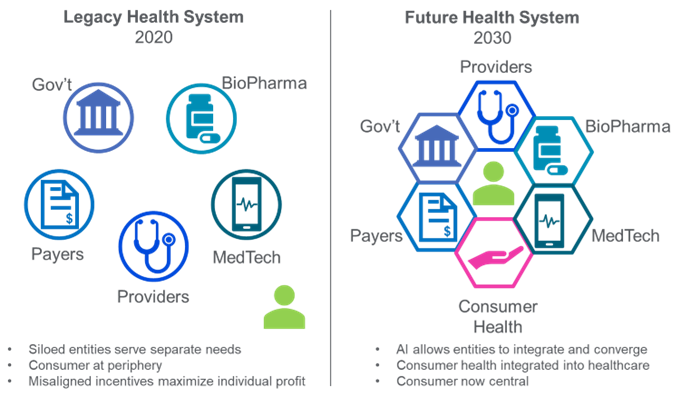
Administration accounts for roughly a quarter of all health spending. It also contributes significantly to clinician burnout.
In the third report in a series, Smart Thinking on AI in Healthcare, Adam Spielman of Citi Global Insights takes a closer look at the how AI-driven automation could save perhaps 25%-30% of admin costs, benefitting staff, improving the patient experiences, and saving time and money.
Healthcare Industry - Fragmentation and Consolidation

© 2023 Citigroup Inc. No redistribution without Citigroup’s written permission.
Source: Deloitte Consulting, Citi Global Insights
Faster information flows among the various parts of the healthcare system are likely to mean they will become more integrated, focusing more and more on the benefits for the consumer, who should be at the heart of everything.
A number of companies – large and small – are debuting products that offer ambient administration, in which a smart speaker listens to conversations between patients and clinicians, and drafts clinical notes. As these systems improve, doctors should be able to spend more time helping their patients and less time on paperwork.
Health administration is important because: (1) administration is a large part of healthcare that’s often underappreciated by outsiders; and (2) it’s also very inefficient:
- Excessive cost: Very roughly ¼ of all spending on healthcare in the U.S. is on administrative tasks, but automation could save perhaps 25%-30% of this.
- Burden on clinicians: Burnout is an increasing problem in many health systems globally, including in the U.S., and more than 90% of clinicians say excessive admin is contributing to burnout.
- Industry fragmentation: Friction in the flow of information means the healthcare system is currently split into distinct entities, e.g., the providers, payers, and government, with little integration among them, and mis-aligned incentives.
More automation means more integration
AI is already starting to help automate a great deal, and the report says the advent of really good understanding of ordinary language will accelerate this.
“AI presents a large opportunity to help reduce bottlenecks and automate several areas of health admin,” says Elliot Jenks, a managing director at Citi’s investment bank, responsible for health services. “That means you could make a lot of processes much more efficient and lower cost.”
And in the future, faster information flows among the various parts of the healthcare system will mean they will become more integrated, focusing more and more on the benefits for the consumer.
A number of companies are debuting products that offer ambient administration, in which a smart speaker listens in to the conversation between patient and clinician, and provides a draft of clinical notes for the physician to approve.
Various estimates suggest that admin accounts for anywhere between 15% and 35% of all healthcare spend in the United States. One recent McKinsey paper put the cost at $950 billion for 2019, 25% of the total healthcare spend that year ($3.8 trillion).
Several companies are already taking note and getting involved. These include Alphabet and Microsoft, as well as several start-ups.
For more details on how these companies are approaching the space, and if you’re a Velocity subscriber, please see the full report, published on 25 April 2023, here. Smart Thinking on AI in Healthcare: Part 3 – Health Administration - AI is likely to automate many tasks, relieving staff, reducing costs, and speeding clinical care
Please also see our previous reports here:
Smart Thinking on AI in Healthcare: Part 2 – Medical Devices - AI is increasingly disrupting radiology, published on 6 April 2023
Smart Thinking on AI in Health: Part 1 – Overview - What’s happened in AI in health, and what’s coming next, published on 28 March 2023
Citi Global Insights (CGI) is Citi’s premier non-independent thought leadership curation. It is not investment research; however, it may contain thematic content previously expressed in an Independent Research report. For the full CGI disclosure, click here.


